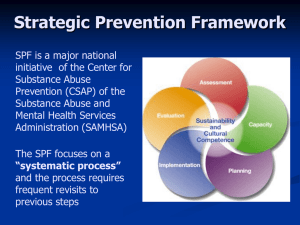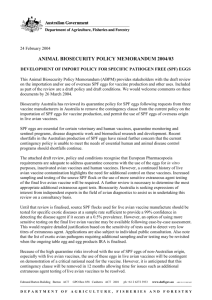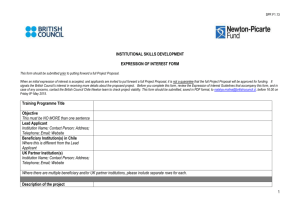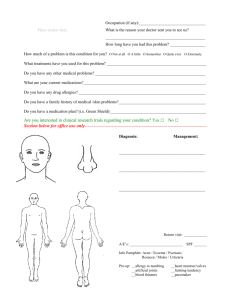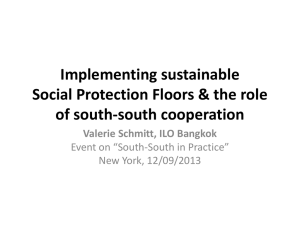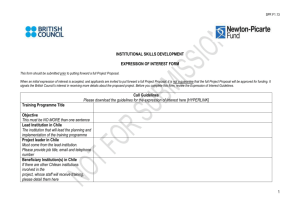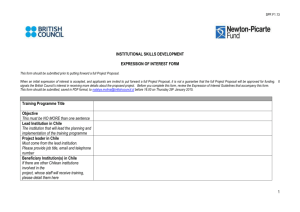Biosecurity Australia POLICY MEMORANDUM 2006/02
advertisement
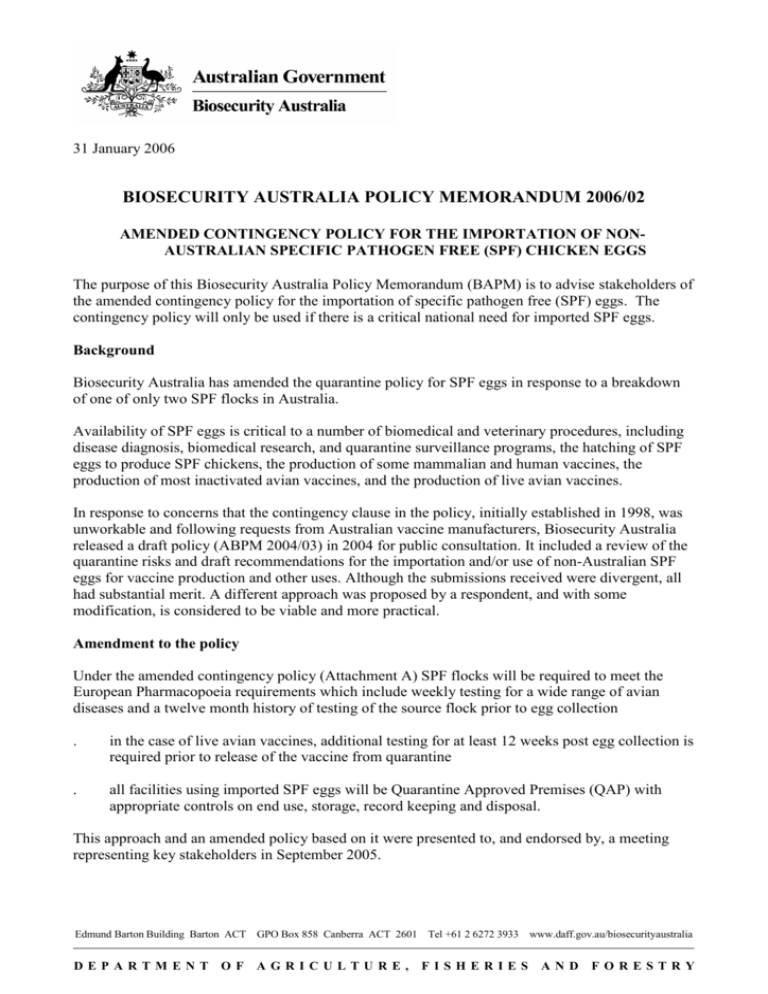
31 January 2006 BIOSECURITY AUSTRALIA POLICY MEMORANDUM 2006/02 AMENDED CONTINGENCY POLICY FOR THE IMPORTATION OF NONAUSTRALIAN SPECIFIC PATHOGEN FREE (SPF) CHICKEN EGGS The purpose of this Biosecurity Australia Policy Memorandum (BAPM) is to advise stakeholders of the amended contingency policy for the importation of specific pathogen free (SPF) eggs. The contingency policy will only be used if there is a critical national need for imported SPF eggs. Background Biosecurity Australia has amended the quarantine policy for SPF eggs in response to a breakdown of one of only two SPF flocks in Australia. Availability of SPF eggs is critical to a number of biomedical and veterinary procedures, including disease diagnosis, biomedical research, and quarantine surveillance programs, the hatching of SPF eggs to produce SPF chickens, the production of some mammalian and human vaccines, the production of most inactivated avian vaccines, and the production of live avian vaccines. In response to concerns that the contingency clause in the policy, initially established in 1998, was unworkable and following requests from Australian vaccine manufacturers, Biosecurity Australia released a draft policy (ABPM 2004/03) in 2004 for public consultation. It included a review of the quarantine risks and draft recommendations for the importation and/or use of non-Australian SPF eggs for vaccine production and other uses. Although the submissions received were divergent, all had substantial merit. A different approach was proposed by a respondent, and with some modification, is considered to be viable and more practical. Amendment to the policy Under the amended contingency policy (Attachment A) SPF flocks will be required to meet the European Pharmacopoeia requirements which include weekly testing for a wide range of avian diseases and a twelve month history of testing of the source flock prior to egg collection . in the case of live avian vaccines, additional testing for at least 12 weeks post egg collection is required prior to release of the vaccine from quarantine . all facilities using imported SPF eggs will be Quarantine Approved Premises (QAP) with appropriate controls on end use, storage, record keeping and disposal. This approach and an amended policy based on it were presented to, and endorsed by, a meeting representing key stakeholders in September 2005. Edmund Barton Building Barton ACT GPO Box 858 Canberra ACT 2601 Tel +61 2 6272 3933 www.daff.gov.au/biosecurityaustralia DEPARTMENT OF AGRICULTURE, FISHERIES AND FORESTRY The policy will only be used if there is a critical national need for imported SPF eggs due to a significant production shortfall in availability of Australian SPF eggs. Approval to use the contingency policy would be sought on a case-by-case basis and involve consultation with key stakeholders, including the Australian Government Department of Health and Ageing, and support by Australia’s Animal Health Committee. Consultation This is considered an interim policy to address any current critical national need. It is anticipated that Biosecurity Australia will review this policy in light of its operation. We would welcome comments from stakeholders on the amended policy or operational issues. Please pass this notice to other interested parties. If those parties wish to be included in future communications on this matter they should get in touch with the contact officer (details below). Information on import risk analyses and policy reviews being conducted by Biosecurity Australia is available on the Internet at http://www.daff.gov.au/biosecurityaustralia. Confidentiality Stakeholders are advised that, subject to the Freedom of Information Act 1982 and the Privacy Act 1988, all submissions received in response to BAPMs will be publicly available and may be listed or referred to in any papers or reports prepared on the subject matter of the Memoranda. The Commonwealth reserves the right to reveal the identity of a respondent unless a request for anonymity accompanies the submission. Where a request for anonymity does not accompany the submission the respondent will be taken to have consented to the disclosure of his or her identity for the purposes of Information Privacy Principle 11 of the Privacy Act. The contents of the submission will not be treated as confidential unless they are marked ‘confidential’ and they are capable of being classified as such in accordance with the Freedom of Information Act. ROBYN MARTIN General Manager Animal Biosecurity Contact Officer: Telephone no: Facsimile no: E-mail: David Buckley (02) 6272 5734 (02) 6272 3399 david.buckley@daff.gov.au
